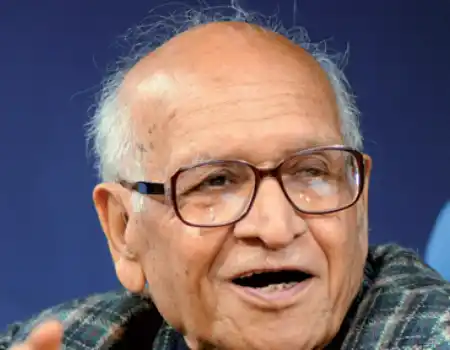Contents
Bipan Chandra was a renowned Indian author, historian, and professor. He is considered one of the distinguished Indian historians. He is known for his famous book ‘India’s Struggle for Independence.’ He had a specialization in Modern Indian History. His first publication was ‘The Rise and Growth of Economic Nationalism in India: Economic Policies of Indian National Leadership, 1880-1905’ published in 1966. Bipan Chandra’s last published book was ‘The Making of Modern India: From Marx to Gandhi, Orient Blackswan” in 2000.
Wiki/Biography
Bipan Chandra was born on Saturday, 24 May 1928 (age 86 Years; at the time of death) in Kangra, Punjab, British India (Now in Himachal Pradesh, India). His zodiac sign was Gemini. Bipan Chandra, an emeritus professor of modern history at Jawaharlal Nehru University, was an Indian author, a teacher, and a prominent historian. During the Indian Independence Movement, Chandra was an active participant in the movement. He was a great scholar and an author, who wrote many books on Mahatma Gandhi. Bipan Chandra did his graduation from Forman Christian College, Lahore in 1946. After that, he earned a master’s degree in history from Stanford University, California, United States in 1949. He received a Ph.D. degree from the University of Delhi in 1963.
Physical Appearance
Hair Colour: Black
Eye Colour: Black
Family & Caste
Bipan Chandra was born in a Sud family.
Wife & Children
Bipan Chandra’s wife’s name was Usha Chandra, and the couple had two children.
Career
Lecturer/Professor
After Senator McCarthy campaigned to deport Bipan Chandra to India, following Chandra’s alleged connection with Marxists in the United States, Chandra returned to India in the 1950s, where he started teaching as a lecturer at Hindu College in Delhi. During this time, he also pursued his doctoral studies at Delhi University. His doctoral dissertation titled ‘The Rise and Growth of Economic Nationalism in India” re-established the efforts of early patriots including Dadabhai Naoroji, R. C. Dutt, and G. V. Joshi. These patriots started India’s anti-colonial struggle.
Bipan Chandra’s Book The Rise and Growth of Economic Nationalism in India
Mr. Chandra started teaching as a professor at Jawaharlal Nehru University in the 1970s, where he was declared “Professor Emeritus” after his retirement in 2007. In 1985, in Amritsar, Punjab, the Indian History Congress designated professor Bipan Chandra as its general president. Bipan Chandra was honored by UGC as the national professor in 1970. The National Book Trust appointed him as a chairman, a post that he held from 2004 to 2012.
The Chairman of National Book Trust Bipan Chandra in 2008
Contributions to Modern Indian History
Bipan Chandra started a journal ‘Enquiry’ in the early 1950s and was a member of its editorial board for a long time. Chandra taught history at Delhi University for 43 years. The book titled ‘Communalism in Modern India (1984)’ was Chandra’s complied analytical work on communalism. Bipan Chandra wrote a monograph titled ‘In the Name of Democracy: JP Movement and the Emergency’ (2003) in which he related the past events of Indian history with the present affairs of Modern India. In this monograph, he conveyed his tense feelings towards Indira Gandhi’s enforcement of the Emergency between 1975 and 1977. The same monograph also stated that many principles of the constitution of India were violated by Jayaprakash Narayan’s movement, which supported communal faces.
In the name of democracy, a book written by Bipan Chandra
The curriculum of the NCERT, especially the textbooks on Modern Indian History for the senior secondary schools in India, was written by Bipan Chandra. Many books for the government jobs entrance papers and competitive examinations including UPSC were contributed by Bipan Chandra.
History of Modern India, a book written by Bipan Chandra for UPSC exams
Bipan Chandra wrote a book ”The Long Term Dynamics of the Indian National Movement” in which he stated that-
The Indian National Movement led by the Indian National Congress was as much a people’s struggle for liberation and had as much to offer to the world in terms of lessons in social transformation and bringing about change in the state structure as the ‘British, French, Russian, Chinese, Cuban and Vietnamese revolutions. The strategic practice of the Congress-led and Gandhi-guided national movement [has] a certain significance in world history being ‘the only actual historical example of a semi-democratic or democratic-type state structure being replaced or transformed, of the broadly Gramscian theoretical perspective of a war of position being successfully practiced. The renowned Italian Marxist Gramsci evaluated this ‘as the only possible strategy’ for social modification ‘in the developed countries of the west.”
‘Communalism in Modern India’ is one of the notable works of Bipan Chandra. He wrote ‘Communalism in Modern India,’ a standard text, for those who want to know and understand how communalism grew and spread at the beginning of the second half of the 19th century. This basically focussed on those readers who wanted to raise voice against communalism in India.
Communalism in Modern India, a revised book of Bipan Chandra
Contributions to Indian Economic History
Bipan Chandra majorly came up with Economic History. He argued in one of his Economic History writings that-
Colonialism did not lead to ‘partial modernization’ or ‘restricted growth’ and whatever little spurts of growth the colony witnessed during the colonial period were not a result of colonialism but were a product of the breaks or the ‘loosening of the links’ from the colonial stranglehold, caused by various crises faced by the metropolitan countries such as the two World Wars and the Great Depression.”


